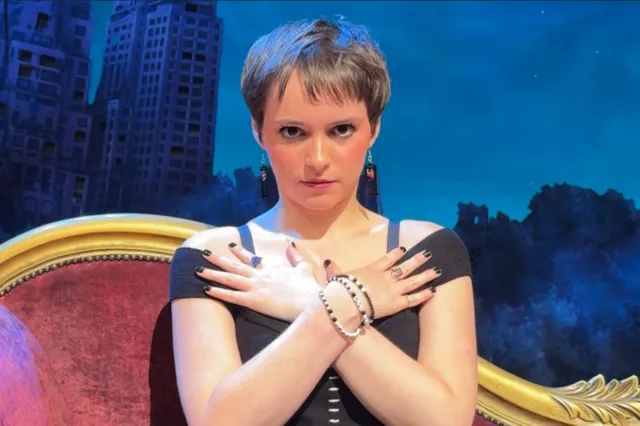Tales from the Bar of Lost Souls (Tour – Workshop Theatre, Leeds)
It is difficult to know what to make of Tales from the Bar of Lost Souls, a joint venture between the National Theatre of Greece, Cyprus Theatre Organisation and UK theatre company, Imitating the Dog, and part of the British Council’s Creative Collaboration project. However, throwing the audience off-balance is undoubtedly one of the aims of writer/director, Andrew Quick, and the rest of his collaborators.
Part film noir, part dream play, Lost Souls is most definitely experimental, but unfortunately, it is also rather inconsequential and is, overall, something to be admired for its ambition rather than embraced for its content.
This particular tale concerns a sailor whose life takes a downward spiral after he absconds from the navy. Drifting through an unnamed port community, complete with ‘ladies of the night’ and femme fatale bartenders, he becomes involved with a local singer and the “flics” (police), before eventually ending up in the titular bar. His story is partly recounted by a dying man via a grainy black and white film projected on to a large omnipresent opaque screen that hangs in front of the set. The screen also displays the English subtitles accompanying the piece, which is largely in French.
It is obvious that much effort has been spent here in trying to create a cinematic experience on stage. As well as the screen, there is the ‘dubbed’, sometimes clunky, overly philosophical, dialogue that gives the piece the feel of an old foreign-language film, as well as the minimalist set. This has been cleverly designed by Laura Hopkins to let the audience watch the action framed through three windows, as the actors themselves move walls and other objects around to create a series of film ‘stills’. There are times when this works humorously well, such as the moment when a punch thrown in the right-hand ‘frame’ hits someone in the left. However, these devices also form part of the problem with Lost Souls as they place an automatic barrier between the audience and the actors.
This distance makes it almost impossible to get a handle on any of the characters or performances, although Adam Nash is suitably moody in the lead role of ‘Sailor’ who, we are constantly told, is a lost soul searching for his true self. The rest of the ensemble – comprised of actors from each of the participating countries (Cyprus, Greece and the UK) – does a serviceable job in their multiple roles.
It is worth noting that, at times, there was also certain unease in the audience as to the tone of the piece, with occasional ripples of tentative laughter, such as during an intimate scene resplendent with rose petals and appropriately-timed animated fireworks projected on to the screen. Given the nature of this work, however, this is no doubt just another attempt to add to the uniqueness of the experience.
While Lost Souls is certainly a bold attempt to challenge the conventions of traditional theatre, the result is not entirely satisfying. This tale feels very much like a chapter out of a longer work, given its modest length of a little over an hour (no interval), and maybe that is part of the problem. Aside from the built-in distance, there just isn’t enough meat on the bones to draw the audience in and involve them emotionally in the story.
However, those involved should be applauded for their ambition, and maybe with greater resources and a larger venue at their disposal, Tales from the Bar of Lost Souls could indeed be transformed into something magical.
– Hannah Giles












